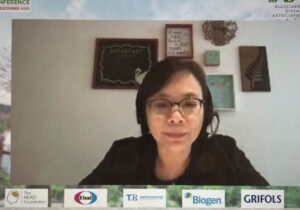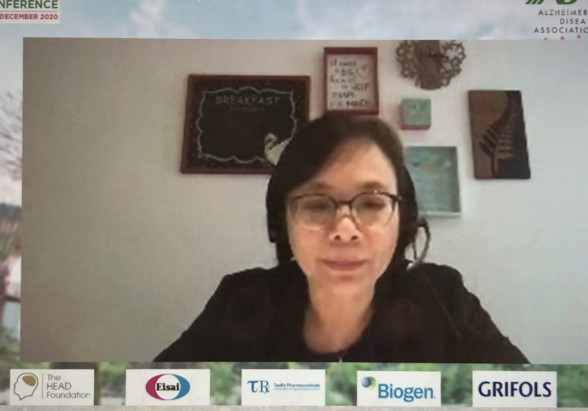 DAI is very proud to highlight this H.O.P.E.ful speech in the Opening Ceremony of the ADI conference by one of our members in Singapore. Emily is now also a very active advocate.
DAI is very proud to highlight this H.O.P.E.ful speech in the Opening Ceremony of the ADI conference by one of our members in Singapore. Emily is now also a very active advocate.
H.O.P.E. in the Age of Dementia
Puan Halimah Yacob, President of the Republic of Singapore
Princess Yasmin Aga Khan, President of the Alzheimer's Disease International
Mr Glenn Rees, Chairman of ADI
Ms Paolo Barbarino, CEO of ADI
Dr Ang Peng Chye, President of the Alzheimer's Disease Association, Singapore
Presenters, Distinguished guests, Individuals living with dementia, care partners, Ladies and Gentleman.
I am Emily Ong, a dementia advocate, co-facilitator of ADA Singapore, Voices for Hope program, Focus Group member of the Global Dementia Observatory, and a member of Dementia Alliance International. It is a privilege to have been given this opportunity to speak on behalf of my global friends who are living with dementia, an affirmation of 'Nothing about us, without us.'
My journey with dementia started with the French Toast incident. French Toast is one yummy, yet simple breakfast to prepare. However, that was not the case for me on one fine, usual morning. I suddenly found myself struggling to remember what ingredients I needed, and how to make French Toast. All I knew was that... I needed bread. I had no recollection or impression that I had made it before. It was like my brain had a blackout.... there was nothing to retrieve at all. That was when my elder daughter, a first year medical student back then, saw an urgent need to make an appointment with a neurologist specialised in cognitive neurology.
I was diagnosed with cognitive impairment and young onset dementia at 51 years old.
It was the worst nightmare I could have ever imagined. How I wished it was just a horrible dream. There were so many unanswered questions. How was it possible that I had dementia despite being young and healthy? Was I going to be useless and needing to depend on others for everything? Were there other young people like me who have this condition? Would I be able to live life as I always had?
There was no post-diagnostic support system in place, to help me process the rawness and brutality of this diagnosis.
There was no one to hold our hands and help us to grieve for the loss of the future we had planned.
I felt so alone and terrified, and yet, I had to put up a brave front for my family, that things will be okay. I cried day and night, until I couldn't cry anymore.
All I knew was that...there is only one way in dementia, and that is a downward spiral, with no hope of cure and no way to maintain my independence. I was told of daycare services, where activities like colouring and playing mahjong were provided to stimulate cognition. Memory cafes where people sang familiar songs to relive memories of yesteryear. None of this made me feel empowered, engaged or enabled.
I was at the lowest point in my life, when I found Dementia Alliance International and the 'Voices for Hope' program. For the first time since my diagnosis, I saw hope and the possibility of living a life with meaning and purpose again.
At DAI and Voices for Hope, we laugh, we discuss, we talk about how to care for ourselves, we inspire and support each other. In short, we are doing all the normal things in life!
This is what I want to share and encourage others to do: live a normalised life. Yes, it will never be the same again. There will be changes, and you might need to adjust your expectations and make adaptations with whatever capacity you still have but... never, never, never doubt your capacity to live your life to the fullest potential.
However, people living with dementia and their care partners need the support from the wider community to have hope again. Do allow me to share my acronym of HOPE with you:
• H for Hear us out - and then tell us what you think of our suggestions. Encourage and support us to have our voice heard. Even though people with dementia may change in the way they think, feel, behave, interact and communicate, this does not mean they don't have feelings, preferences, opinions or thoughts.
• O for Offer support - Why offer not provide? Because assistance is meant to enable us to help ourselves and maintain our functioning. The daily capacity to do things has a direct influence on the independence of people with dementia,and their quality of life. So, let the person living with dementia decide the kinds and level of support needed.
• P for Partner with us - let us guide you with our lived expertise in our conditions. Involve people living with dementia in the planning of Programmes and activities. This not only empowers these individuals, but also leads to more effective use of resources and better outcomes.
• E for Enable us - Focus on our remaining capacity. Minimise and compensate for any functional changes resulting from the disability caused by dementia. People living with dementia need rehabilitation programs, it can be neurological or physical rehabilitation, to help them regain the highest level of function and independence possible, while improving their overall quality of life - physically, emotionally, and socially.
So, please embrace the H.O.P.E. acronym so that you can shine Hope into the lives of those living and affected by dementia.
Thank you.
